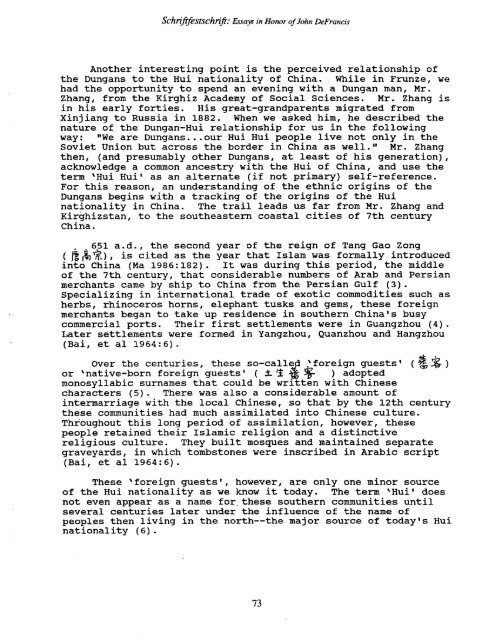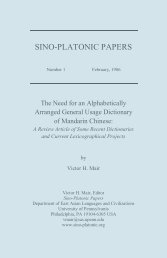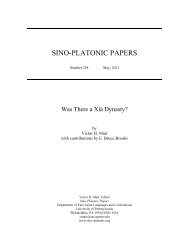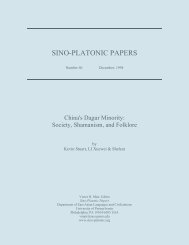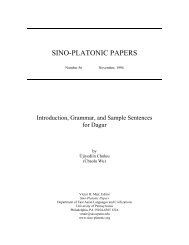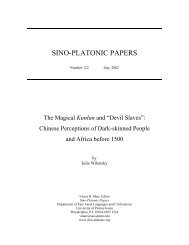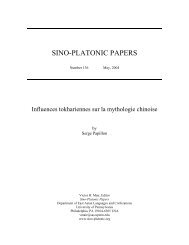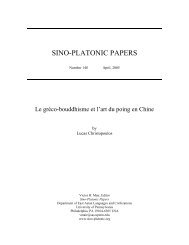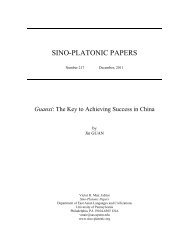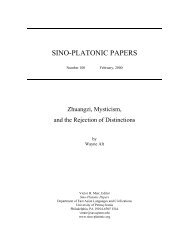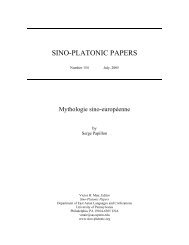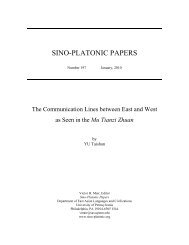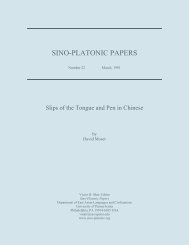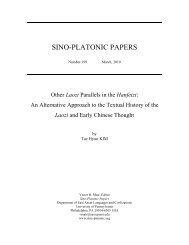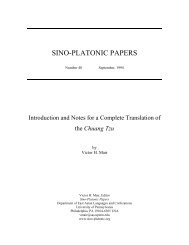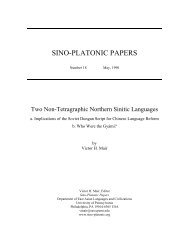Essays on Writing and Language in Honor - Sino-Platonic Papers
Essays on Writing and Language in Honor - Sino-Platonic Papers
Essays on Writing and Language in Honor - Sino-Platonic Papers
Create successful ePaper yourself
Turn your PDF publications into a flip-book with our unique Google optimized e-Paper software.
Another <strong>in</strong>terest<strong>in</strong>g po<strong>in</strong>t is the perceived relati<strong>on</strong>ship of<br />
the Dungans to the Hui nati<strong>on</strong>ality of Ch<strong>in</strong>a. While <strong>in</strong> Frunze, we<br />
had the opportunity to spend an even<strong>in</strong>g with a Dungan man, Mr.<br />
Zhang, from the Kirghiz Academy of Social Sciences. Mr. Zhang is<br />
<strong>in</strong> his early forties. His great-gr<strong>and</strong>parents migrated from<br />
X<strong>in</strong>jiang to Russia <strong>in</strong> 1882. When we asked him, he described the<br />
nature of the Dungan-Hui relati<strong>on</strong>ship for us <strong>in</strong> the follow<strong>in</strong>g<br />
way: 'We are Dungans ... our Hui Hui people live not <strong>on</strong>ly <strong>in</strong> the<br />
Soviet Uni<strong>on</strong> but across the border <strong>in</strong> Ch<strong>in</strong>a as well." Mr. Zhang<br />
then, (<strong>and</strong> presumably other Dungans, at least of his generati<strong>on</strong>),<br />
acknowledge a comm<strong>on</strong> ancestry with the Hui of Ch<strong>in</strong>a, <strong>and</strong> use the<br />
term \Hui Huil as an alternate (if not primary) self-reference.<br />
For this reas<strong>on</strong>, an underst<strong>and</strong><strong>in</strong>g of the ethnic orig<strong>in</strong>s of the<br />
Dungans beg<strong>in</strong>s with a track<strong>in</strong>g of the orig<strong>in</strong>s of the Hui<br />
nati<strong>on</strong>ality <strong>in</strong> Ch<strong>in</strong>a. The trail leads us far from Mr. Zhang <strong>and</strong><br />
~irghizstan, to the southeastern coastal cities of 7th century<br />
Ch<strong>in</strong>a.<br />
651 a.d., the sec<strong>on</strong>d year of the reign of Tang Gao Z<strong>on</strong>g<br />
( &*), is cited as the year that Islam was formally <strong>in</strong>troduced<br />
<strong>in</strong>to Ch<strong>in</strong>a (Ma 1986:182). It was dur<strong>in</strong>g this period, the middle<br />
of the 7th century, that c<strong>on</strong>siderable numbers of Arab <strong>and</strong> Persian<br />
merchants came by ship to Ch<strong>in</strong>a from the Persian Gulf (3).<br />
Specializ<strong>in</strong>g <strong>in</strong> <strong>in</strong>ternati<strong>on</strong>al trade of exotic commodities such as<br />
herbs, rh<strong>in</strong>oceros horns, elephant tusks <strong>and</strong> gems, these foreign<br />
merchants began to take up residence <strong>in</strong> southern Ch<strong>in</strong>a's busy<br />
commercial ports. Their first settlements were <strong>in</strong> Guangzhou (4).<br />
Later settlements were formed <strong>in</strong> Yangzhou, Quanzhou <strong>and</strong> Hangzhou<br />
(Bai, et a1 1964:6).<br />
Over the centuries, these so-called .\ foreign guests ( $ )<br />
or \native-born foreign guests1 ( 2 ) adopted<br />
m<strong>on</strong>osyllabic surnames that could be wrltten with Ch<strong>in</strong>ese<br />
characters (5). There was also a c<strong>on</strong>siderable amount of<br />
<strong>in</strong>termarriage with the local Ch<strong>in</strong>ese, so that by the 12th century<br />
these communities had much assimilated <strong>in</strong>to Ch<strong>in</strong>ese culture.<br />
Throughout this l<strong>on</strong>g period of assimilati<strong>on</strong>, however, these<br />
people reta<strong>in</strong>ed their Islamic religi<strong>on</strong> <strong>and</strong> a dist<strong>in</strong>ctive<br />
religious culture. They built mosques <strong>and</strong> ma<strong>in</strong>ta<strong>in</strong>ed separate<br />
graveyards, <strong>in</strong> which tombst<strong>on</strong>es were <strong>in</strong>scribed <strong>in</strong> Arabic script<br />
(Bai, et a1 1964: 6) .<br />
These 'foreign guests1, however, are <strong>on</strong>ly <strong>on</strong>e m<strong>in</strong>or source<br />
of the Hui nati<strong>on</strong>ality as we know it today. The term \HuiV does<br />
not even appear as a name for-these southern communities until<br />
several centuries later under the <strong>in</strong>fluence of the name of<br />
peoples then liv<strong>in</strong>g <strong>in</strong> the north--the major source of today's Hui<br />
nati<strong>on</strong>ality (6) .


